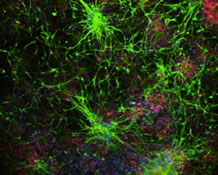Columbia University
Irving Medical Center
Neurological Institute
710 West 168th Street, 3rd floor
(212) 305-1818
About Us
Taub Faculty
The major focus of our laboratory is the study of the molecular mechanisms of neuronal death. Neuronal loss is an outstanding feature of neurodegenerative diseases, such as Alzheimer's disease, Parkinson's disease and amyotrophic lateral sclerosis. We employ model systems of neuronal death to define the death pathways. We are particularly interested in the regulation of the caspases, the family of proteases that are central to the execution of death. Current death paradigms under study include beta-amyloid toxicity, peroxynitrite-mediated death and neurotrophin-withdrawal-induced death and a mouse model of ischemia.
We have developed specific molecular tools for knocking down individual members of the death pathways in post-mitotic (neuronal) cells in vitro and in vivo. We have shown that the specificity of the death pathway is determined by the stimulus inducing death but also that there is flexibility in the pathways chosen for executing death. The dominant pathway depends on the relative concentrations of anti- and pro-apoptotic proteins. This illustrates that the maintenance of life and execution of death of a neuron is a delicate balance of the pro- and anti-apoptotic molecules in the cell, a balance that can be altered in disease.
Our studies of oxidative stress-mediated death show that cytokines can induce an autocrine mediated death. Down-regulation of superoxide dismutase 1 leads to activation of caspase-1 which releases the cytokine interleukin-1-beta and the cells undergo a peroxynitrite-dependent death. Thus, although caspase-1 has been defined as a non-apoptotic caspase with a role in inflammation, in response to specific death stimuli caspase-1 can activate a death pathway. It is important to understand the interactions that can occur between the cytokine signaling pathway and the death pathway to determine the appropriate intervention that will result in increased neuronal survival. These studies are now being extended to a mouse model of ischemia.


